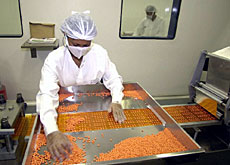
Swiss NGOs criticise WTO drug agreement

Swiss non-governmental organisations (NGOs) have reacted angrily to a new agreement that will grant poorer nations access to cheap anti-Aids and other vital drugs.
They claim that the accord – agreed by the World Trade Organization (WTO) in Geneva on Saturday – contains reams of red tape which will stop drugs reaching those in need.
The agreement sets out conditions under which patents can be waived to allow developing countries to import cheap generic drugs to fight critical diseases such as Aids, tuberculosis and malaria.
“The ability to import cheap generic drugs is being undermined by adding more conditions and restrictions so there will probably be only very limited use of this agreement,” Bernhard Herold of the Berne Declaration told swissinfo.
Long negotiations
The WTO deal ends almost two years of wrangling over the issue. A previous attempt to reach an agreement in December was torpedoed by the United States.
Washington blocked the accord – agreed by all other WTO members – citing fears that generic producers in countries such as India and Brazil would flood the market with cheap copies of patented drugs.
Saturday’s agreement was reached after the US, along with Brazil, India, South Africa and Kenya, ironed out differences and last-minute hitches. An accompanying statement adding further conditions will now be added to December’s draft accord.
These include a pledge by WTO states not to abuse the system and to only waive patents to import generic medicines “in good faith” and not for commercial gain.
Striking a balance
Thomas Cueni, who heads up Interpharma, an umbrella organisation for Swiss pharmaceutical research companies, welcomed the agreement.
“We have struck a balance between easy access for developing countries to essential medicines,” Cueni told swissinfo, “while at the same time respecting the importance of protecting intellectual property.”
Pharmaceutical companies maintain that without patent protection they would not be able to invest in developing new drugs.
But the Berne Declaration’s Bernhard Herold insists Swiss pharmaceutical firms are only interested in selling their drugs at the highest prices possible.
“Switzerland has been hiding behind the US government… they were always looking for a solution that was as restrictive as possible for developing countries.”
swissinfo, Isobel Johnson and Karin Kamp
World Trade Organization members met for six straight days to discuss the agreement.
The deal hit obstacles during the meetings, when several countries disagreed with the wording of the chairman’s statement.
Some developing countries said they would only accept the agreement if measures taken to prevent smuggling didn’t raise the price of the medicines.

In compliance with the JTI standards
More: SWI swissinfo.ch certified by the Journalism Trust Initiative



























You can find an overview of ongoing debates with our journalists here . Please join us!
If you want to start a conversation about a topic raised in this article or want to report factual errors, email us at english@swissinfo.ch.